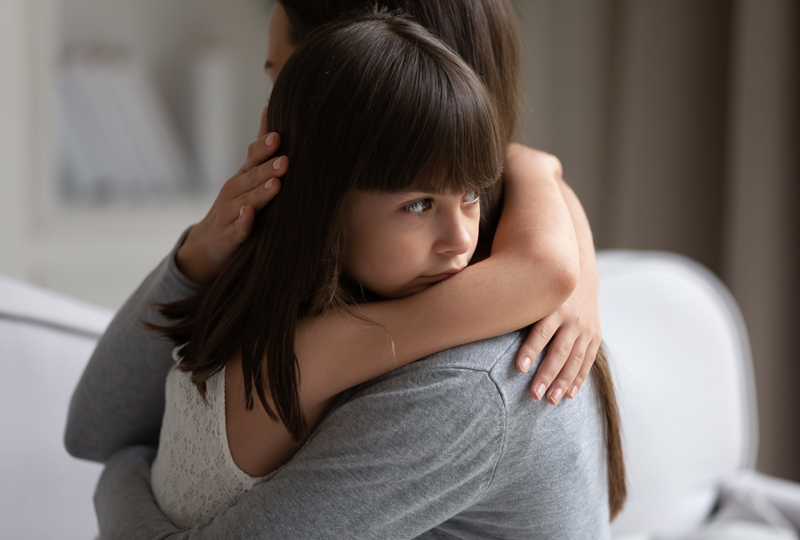Has your child reverted to outgrown behaviors like baby talk or bed-wetting? Here’s what you need to know about regression during COVID-19.
Even though we try to shield our children from experiencing the fear of uncertainty, kids of all ages are not immune to stress, and they are perceptive. The COVID-19 pandemic has been challenging for everyone. And in the Mid-South, shelter-in-place protocols went into effect shortly after an outbreak of devastating tornadoes hit the region. In some families, trauma, disrupted routines and physical distancing measures have led to instances of childhood regression. Childhood regression is when a child reverts to an earlier developmental stage. But we have solutions to help you and your child cope.
“Children don’t always have the fully developed coping skills that adults do,” said Giovanni M. Billings, PsyD, IMH-E, assistant professor of clinical psychiatry and behavioral sciences at Vanderbilt University Medical Center. When a stressor occurs in a child’s life, it requires the child’s mental energy to cope, and that change in focus may detract from normal growth and development, Billings added.
Recognizing childhood regression
Billings said he has noticed an uptick in childhood regression in 2020 — and in kids of all ages. “The stress level on kids and families is very high,” he explained. So what does childhood regression look like? Kids in early childhood might start having accidents again after being successfully potty trained, Billings explained. Others who typically sleep through the night might experience disrupted sleep patterns. “Sometimes children who have good age-appropriate language skills will begin to talk in baby talk,” he added. Older kids who have outgrown certain toys may return to playing with those items. Billings outlined a three-part process for helping your child feel safe and get back on track.
-
Identify
The first step is to identify what the regression behavior is about. “Instead of addressing the regression more directly,” Billings said, “address the underlying cause, which is the distress.” Rather than rigidly holding expectations, like banning baby talk, have a conversation about what might be bothering your child. Although the pandemic is at the forefront of people’s minds right now, other reasons a child might exhibit regression include a death in the family, a divorce, the birth of a new sibling, a severe illness, a car accident, a house fire or any other type of trauma.
-
Validate
The next step is to validate what your child might be feeling by naming the concern. Billings offered the following language in the context of the pandemic: “I know this is a scary time. You’re worried about whether we’re going to be healthy as a family. I’m going to do everything I can to keep you safe.” You can validate your child’s feelings in nonverbal ways, as well. Holding or hugging are examples. “Validating can be showing attention to the child if they’re drawing how they are feeling,” Billings added.
-
Help your child cope
Young children can feel stress or absorb the tension or tone around them before they even understand words.
By identifying and validating, you’re already helping your child cope with what’s on their mind. Young children can feel stress or absorb the tension or tone around them before they even understand words, Billings said. And a lack of understanding what they are feeling can be part of what causes the regression, he explained. That’s why identifying and validating their emotions is so important. “Adults putting words to that actually helps contain and organize and soothe a child’s experience,” he said. Keep in mind that older children may also have a hard time understanding what they are experiencing — especially when it comes to anxiety, which can present itself physically. Coping may also involve helping children of any age practice relaxation skills like deep breathing, visualizing a calm place or trying yoga, Billings said.
When to see a health care provider
If you’ve attempted to identify and validate your child’s feelings and your child doesn’t eventually return to their usual developmental trajectory, consider seeing a therapist, Billings suggested. Although timelines are complicated right now because the pandemic is ongoing, seek help if the regression behavior lasts longer than a month or two, Billings said.
Regression related to a life-changing event like the COVID-19 pandemic is called psychological regression. But there is another type that is neurodevelopmental. Neurodevelopmental regression involves a biologically based disorder, Billings explained. And it will often affect multiple developmental areas, such as language, motor and cognitive skills. “If you are seeing regression across many areas that gets worse over time and does not respond to emotional support,” Billings said, “consult with your pediatrician.”

Staying Safe is Essential. So is Your Child’s Care.
Monroe Carell Jr. Children’s Hospital at Vanderbilt is taking a careful approach to help keep your child and family safe, along with team members. Safety actions follow recommendations by the Centers for Disease Control and Prevention and other trusted experts.
COVID-19 is not the only threat to your child’s health and well-being. Many illnesses and conditions can cause serious problems. Good preventative care and early treatment can save lives. Please don’t delay important healthcare for your child — including all-important immunizations.

